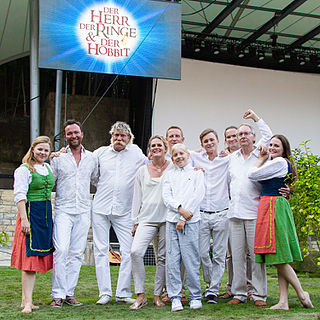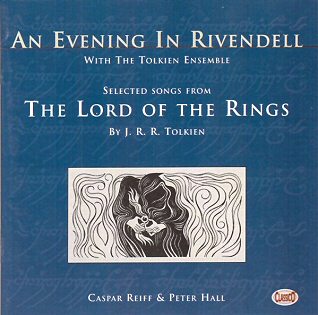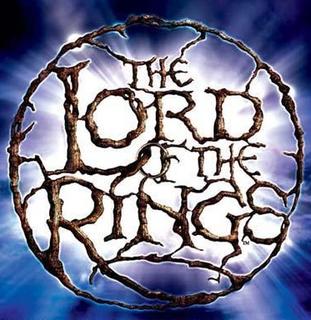
Gandalf is a protagonist in J. R. R. Tolkien's novels The Hobbit and The Lord of the Rings. He is a wizard, one of the Istari order, and the leader and mentor of the Fellowship of the Ring. Tolkien took the name "Gandalf" from the Old Norse "Catalogue of Dwarves" (Dvergatal) in the Völuspá.

Rivendell is a valley in J. R. R. Tolkien's fictional world of Middle-earth, representing both a homely place of sanctuary and a magical Elvish otherworld. It is an important location in The Hobbit and The Lord of the Rings, being the place where the quest to destroy the One Ring began.

The Lord of the Rings: The Fellowship of the Ring is a 2001 epic fantasy adventure film directed by Peter Jackson, based on the 1954 novel The Fellowship of the Ring, the first volume of J. R. R. Tolkien's The Lord of the Rings. The film is the first installment in the Lord of the Rings trilogy. It was produced by Barrie M. Osborne, Jackson, Fran Walsh and Tim Sanders, and written by Walsh, Philippa Boyens and Jackson. The film features an ensemble cast including Elijah Wood, Ian McKellen, Liv Tyler, Viggo Mortensen, Sean Astin, Cate Blanchett, John Rhys-Davies, Billy Boyd, Dominic Monaghan, Orlando Bloom, Christopher Lee, Hugo Weaving, Sean Bean, Ian Holm, and Andy Serkis. It was followed in 2002 by The Two Towers and in 2003 by The Return of the King.

The Return of the King is a 1980 animated musical fantasy television film created by Rankin/Bass and Topcraft. It is an adaptation of the 1955 high fantasy novel The Return of the King, being the third and final volume of The Lord of the Rings by J. R. R. Tolkien, and is a sequel to the 1977 film The Hobbit.

The Tolkien Ensemble is a Danish ensemble which successfully aimed to create "the world's first complete musical interpretation of the poems and songs from The Lord of the Rings". They published four CDs from 1997 to 2005, in which all the poems and songs of The Lord of the Rings are set to music. The project was approved by both the Tolkien family and HarperCollins Publishers. Queen Margrethe II of Denmark gave permission to use her illustrations in the CD layout.
"The Road Goes Ever On" is a title that encompasses several walking songs that J. R. R. Tolkien wrote for his Middle-earth legendarium. Within the stories, the original song was composed by Bilbo Baggins and recorded in The Hobbit. Different versions of it also appear in The Lord of the Rings, along with some similar walking songs.

An Evening in Rivendell is the first album by the Danish group The Tolkien Ensemble. It features songs composed to the lyrics found in J. R. R. Tolkien's The Lord of the Rings and forms the first part of what was to become a complete musical interpretation of all lyrics in the book.

At Dawn in Rivendell is the third album by the Danish group the Tolkien Ensemble. It featured a guest appearance by the actor and singer Christopher Lee, who voiced the spoken word tracks and sang the part of the Ent Treebeard.

Leaving Rivendell is the fourth album by the Danish group The Tolkien Ensemble, with Christopher Lee as additional vocalist. It features songs composed to the lyrics found in The Lord of the Rings by J. R. R. Tolkien and forms the end part of a complete musical interpretation of all lyrics in the book.
A Elbereth Gilthoniel is an Elvish hymn to Varda (Elbereth) in J. R. R. Tolkien's The Lord of the Rings. It is written in Sindarin, and not translated in the main text where it is first presented.
"A Walking Song" is a poem in The Lord of the Rings. It appears in the third chapter, entitled "Three is Company". It is given its title in the work's index to songs and poems. There is a companion poem near the end of the novel.

The Lord of the Rings is the most prominent of several theatre adaptations of J. R. R. Tolkien's epic high fantasy novel of the same name, with music by A. R. Rahman, Christopher Nightingale and the band Värttinä, and book and lyrics by Matthew Warchus and Shaun McKenna.
"The Council of Elrond" is the second chapter of Book 2 of J. R. R. Tolkien's bestselling fantasy work, The Lord of the Rings, which was published in 1954–1955. It is the longest chapter in that book at some 15,000 words, and critical for explaining the power and threat of the One Ring, for introducing the final members of the Fellowship of the Ring, and for defining the planned quest to destroy it. Contrary to the maxim "Show, don't tell", the chapter consists mainly of people talking; the action is, as in an earlier chapter "The Shadow of the Past", narrated, largely by the Wizard Gandalf, in flashback. The chapter parallels the far simpler Beorn chapter in The Hobbit, which similarly presents a culture-clash of modern with ancient. The Tolkien scholar Tom Shippey calls the chapter "a largely unappreciated tour de force". The Episcopal priest Fleming Rutledge writes that the chapter brings the hidden narrative of Christianity in The Lord of the Rings close to the surface.

The Hunt for Gollum is a 2009 British fantasy fan film based on the appendices of J. R. R. Tolkien's 1954–55 book The Lord of the Rings. The film is set in Middle-earth, when the wizard Gandalf the Grey fears that Gollum may reveal information about the One Ring to Sauron. Gandalf sends ranger Aragorn on a quest to find Gollum.
Aragorn is a fictional character and a main protagonist in J. R. R. Tolkien's The Lord of the Rings. Aragorn was a Ranger of the North, first introduced with the name Strider and later revealed to be the heir of Isildur, King of Gondor. He was a confidant of Gandalf and part of the quest to destroy the One Ring and defeat the Dark Lord Sauron. He fell in love with the immortal elf Arwen, as told in The Tale of Aragorn and Arwen; her father, Elrond, forbade them to marry unless Aragorn became King of both Arnor and Gondor.
Frodo Baggins is a fictional character in J. R. R. Tolkien's writings, and one of the protagonists in The Lord of the Rings. Frodo is a hobbit of the Shire who inherits the One Ring from his cousin, described familiarly as "uncle", Bilbo Baggins and undertakes the quest to destroy it in the fires of Mount Doom in Mordor. He is mentioned in Tolkien's posthumously published works, The Silmarillion and Unfinished Tales.

The Fellowship of the Ring is the first of three volumes of the epic novel The Lord of the Rings by the English author J. R. R. Tolkien. It is followed by The Two Towers and The Return of the King. It takes place in the fictional universe of Middle-earth. It was originally published on 29 July 1954 in the United Kingdom.

Hobitit is a nine-part Finnish live action fantasy television miniseries directed by Timo Torikka, originally broadcast in 1993 on Yle TV1.
The poetry in The Lord of the Rings consists of the poems and songs written by J. R. R. Tolkien, interspersed with the prose of his high fantasy novel of Middle-earth, The Lord of the Rings. The book contains over 60 pieces of verse of many kinds; some poems related to the book were published separately. Seven of Tolkien's songs, all but one from The Lord of the Rings, were made into a song-cycle, The Road Goes Ever On, set to music by Donald Swann. All the poems in The Lord of the Rings were set to music and published on CDs by The Tolkien Ensemble.
The Song of Eärendil is the longest poem in The Lord of the Rings. In the fiction, it is sung and composed by the Hobbit Bilbo Baggins in the Elvish sanctuary of Rivendell. The work is described by the Tolkien scholar Tom Shippey as exemplifying "an elvish streak ... signalled ... by barely-precedented intricacies" of poetry.












